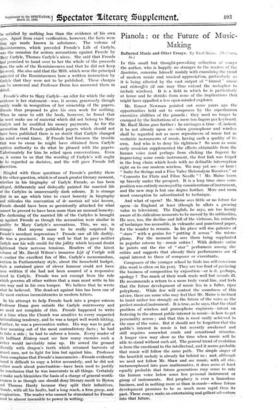Piatiola : or the Future of Music- Reflected Music and
Other Essays. By Basil Maine. (Methuen.
; 5s.)
IN this small but thought-provoking collection of essays the author, who is happily no stranger to the readers of the Spectator, concerns himself mainly with examining the trend of modern music and musical appreciation, particularly as it is being affected by the vast outpitt of " tinned " music and, rechauffes (if one may thus extend the metaphor to include wireless). It is a field in which he is particularly at home and he shrinks from none of the implications that might have appalled a less open-minded explorer.
Mr. Ernest Newman pointed out some years ago the opportunities held out to composers by the superhuman executive abilities of the pianola : they need no longer be cramped by the limitations of a mere ten fingers per keyboard. Mr. Basil Maine goes further : he envisages a time—if, indeed, it be not already upon us—when gramophone and wireless shall be regarded not as mere reproducers of music but as veritable instruments of music, having each a quality of its own. And who is to deny his rightness ? So soon as some early musician supplemented the effects obtainable from the human voice (and perhaps from clicking the fingers) by improvising some crude instrument, the first link was forged in the long chain which leads with no definable interruption right on to our modern wireless. We may yet see—or hear : " Suite for Strings and a Five Valve Heterodyne Receiver," or " Concerto for Flute and Fibre Needle " ! Mr. Maine bears up bravely under the prospect. It is a long time since com- position was entirely unswayed by considerations of instrument, and the new step is but one degree further. More and more must conception be subordinated to technique.
And what of opera? Mr. Maine sees little or no future for opera—in England at least (though he allots a growing value to television). The English, he says, are too keenly aware of its ridiculous moments to be moved by its sublimities. He sees, too, the decline and fall of the virtuoso, his miracles of technique too accessible, in vulcanite and punctured paper, for the wonder to remain. In his place will rise galaxies of " stars " with a genius for " putting it across " the micro- phone. For the moment he sees them being supplanted in popular esteem by—music critics ! With delicate satire he points out the rise of " star " performers among the critics and suggests that already their performances are of equal interest to those of composer or executants.
Composers of the younger school he finds too self-eonseious (the word is often on his pen). They are too fond of prefacing the business of composition by exposition—or is it, perhaps, apology ? Too much of their work reads well but sounds ill. He recommends a return to a more truly vocal line, and feels that the future development of music lies in a fuller, riper polyphony. While few will contest the soundness of this advice, there are some who may feel that Mr. Maine is inclined to insist rather too strongly on the future of the voice as the perfect musical instrument. It is true, as he says, that the chief problem of wireless and gramophone engineers—intent on fostering to the utmost public interest in music—is how to get personality across ; and that this is most easily achieved in the case of the voice. But it should not be forgotten that the public's interest in music is but recently awakened and still requires somewhat crude and sensational stimulus. A longer view may show us the time when music will be able to stand without such aid. The general trend of evolution is from the emotional to the intellectual, and it seems probable that music will follow the same path. The simple singer of the heartfelt melody is already far behind us ; and, although we need not follow Mr. Shaw and see music, with all else, metamorphosed into pure mathematics, it does seem at least equally probable that future generations may come to rate the human voice below some less personal instrument oz group of instruments. But prophecy is ever a hazardous business, and in nothing more so than in music—whose future development promises to be so much more rapid than its past. These essays make an entertaining and gallant adventure into that future.


















































 Previous page
Previous page